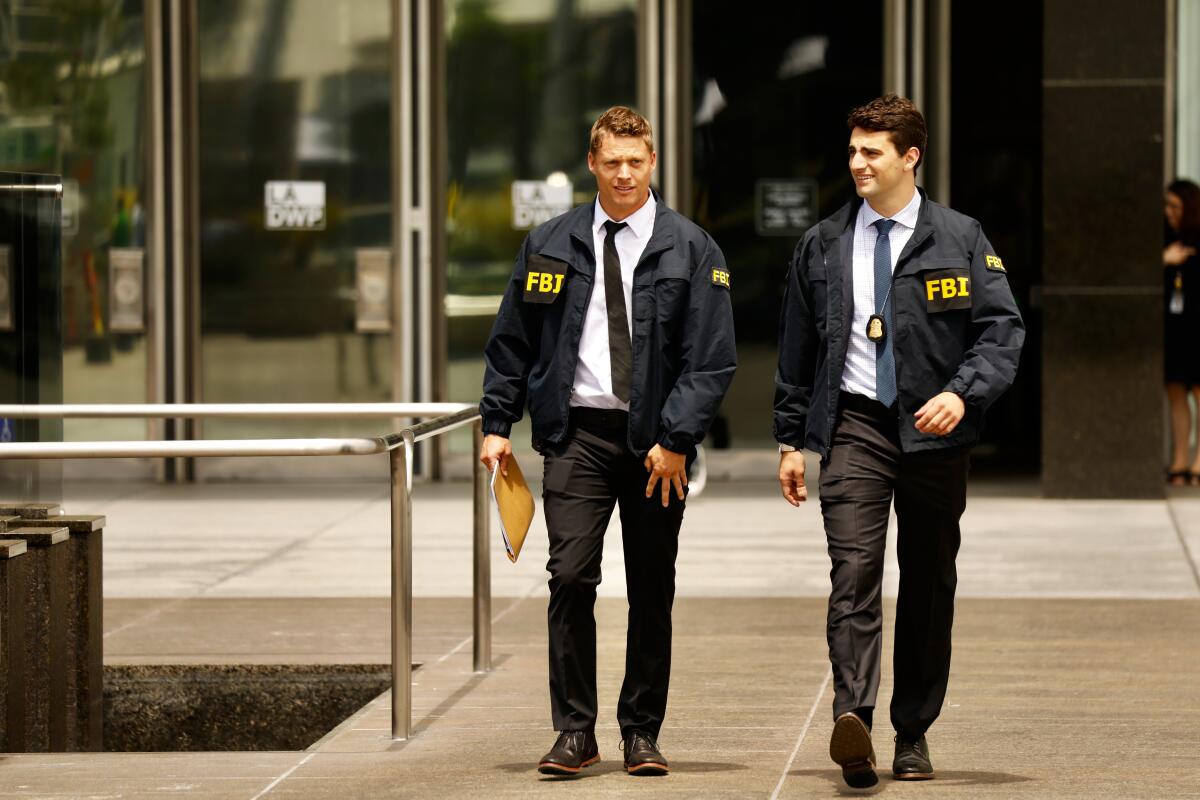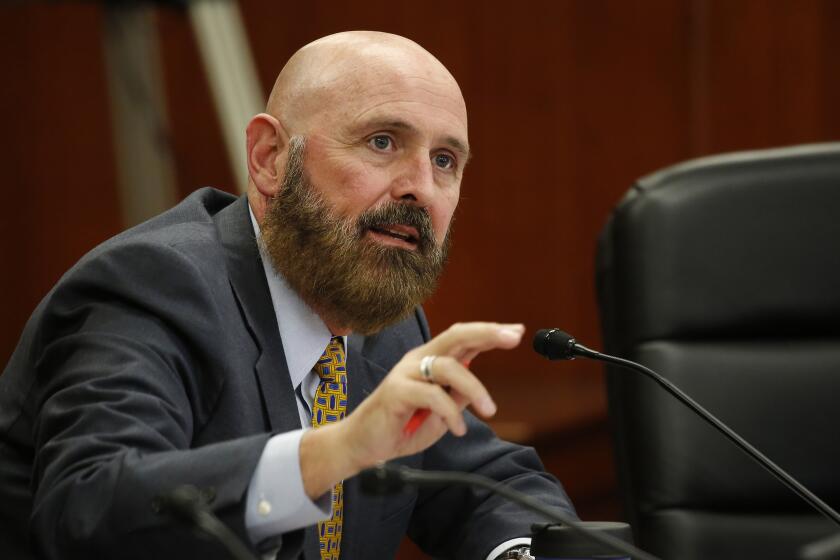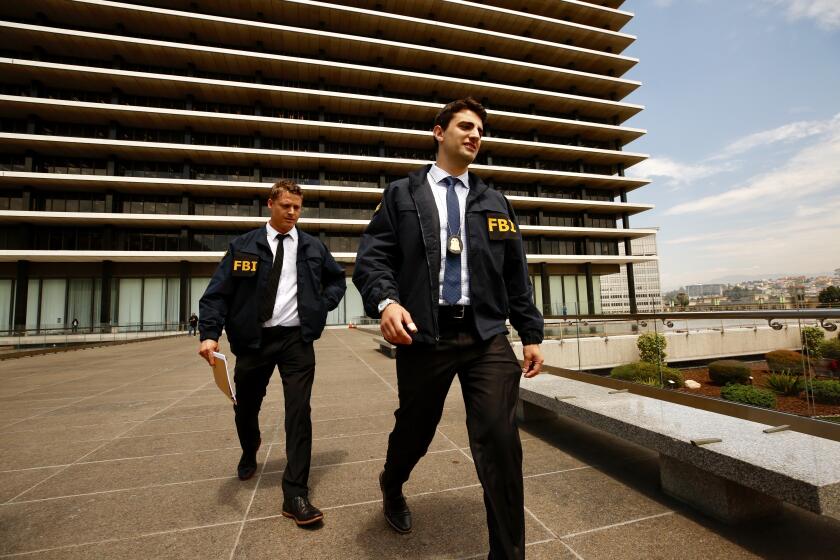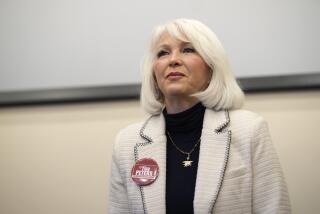Former high-level lawyer with L.A. city attorney agrees to plead guilty in DWP scandal

- Share via
A former high-level lawyer in Los Angeles City Atty. Mike Feuer’s office has agreed to plead guilty in the federal corruption probe of the Department of Water and Power billing debacle, becoming the first staffer under Feuer to do so.
Thomas Peters, 55, of Pacific Palisades, agreed to plead guilty to one count of aiding and abetting extortion. In his plea agreement, made public on Monday, he admitted that he threatened to fire one of the city’s outside lawyers unless that lawyer paid off a person who was threatening to reveal damaging information about city lawyers’ handling of the DWP mess.
Peters, who worked as chief of the civil litigation branch, joined Feuer’s office in 2014, and handled the bulk of claims or lawsuits filed against or brought by the city. He resigned in 2019.
A lawyer for Peters did not respond to a request for comment. Feuer, in a statement, said he is “furious and disappointed beyond words” that one of his own employees committed such a “breach of trust.”
“Nearly three years ago I asked for and received the resignation of this individual because of unrelated past conduct,” Feuer said. “But at no time until today was I aware of Mr. Peters’ illegal actions. With his admission of wrongdoing we finally know the truth of what happened.”
Feuer also acknowledged that he hired Peters. “I own that choice,” he said.
The plea deal will almost certainly complicate Feuer’s bid for mayor in the June 7 primary election. Until now, the only government officials who had struck plea deals were former DWP executives — not any employees of the city attorney’s office.
Monday’s announcement marks the latest plea agreement in a federal investigation that became publicly known in July 2019, when FBI agents searched the city attorney’s office and DWP headquarters.
Last month, prosecutors announced that former DWP general manager David H. Wright agreed to plead guilty to bribery. Wright admitted in his plea agreement that he pushed for the DWP to award a $30-million no-bid contract to a company in exchange for a $1 million-per-year job and use of a Mercedes at that company once he retired from the DWP.
Prosecutors also announced a plea deal with David Alexander, the DWP’s former chief cyber risk officer. Alexander admitted he lied to FBI agents about his conversations with Paul Paradis, an attorney hired by Feuer’s office to handle litigation sought by the DWP over the disastrous rollout of its billing system, which sent inaccurate bills to hundreds of thousands of customers.
Paradis had been brought on by Feuer’s office to sue PricewaterhouseCoopers, the consulting firm that the city blamed for the billing debacle.
The city attorney’s office also retained Beverly Hills attorney Paul Kiesel, who worked with Paradis on the case.
Former Department of Water and Power official David Wright has agreed to plead guilty to a bribery charge, the U.S. attorney’s office said Monday.
Around the time Paradis began working with the city, he had also been representing Antwon Jones, a DWP customer who had been looking to the sue over faulty utility bills. Several DWP ratepayers already had filed lawsuits against the utility on that issue.
The city attorney’s office was aware that Paradis had represented Jones, prosecutors have said.
In his plea agreement, Paradis said he was authorized by the city attorney’s office to find a lawyer to represent Jones who would be “friendly to the city and its litigation goals.” That way, the class action lawsuit involving Jones and other ratepayers, would be settled quickly and in a way that was “orchestrated by the city on the terms desired by the city.”
Paradis reached out to an attorney in Ohio and asked him to represent Jones in his lawsuit against the city. Paradis told the lawyer in Ohio, who has not been named in any of the filings, that he would secretly do all or most of the work in the case, in exchange for a 20% cut of the legal fees the Ohio lawyer would receive once a settlement was reached, according to his plea agreement.
With Paradis working both for the city and the lawyer in Ohio, there was “no attorney fulfilling the ethical duty to represent the best interests of Mr. Jones or the class of LADWP ratepayers through a true adversarial process,” his plea agreement states.
The DWP settled the class-action lawsuit with its ratepayers for $67 million, with Paradis secretly collecting a $2.175-million kickback from the attorney in Ohio, according to his plea agreement.
In November 2017, Peters — then heading the civil litigation office for Feuer — learned that a former employee of Kiesel’s, the outside lawyer helping to sue PricewaterhouseCoopers, had threatened to go public with damaging information about the city’s handling of the billing litigation unless she received more than $1 million, the plea agreement states.
That former employee had “sensitive documents” showing that the city’s legal team had secretly colluded with the lawyer representing DWP ratepayers in the billing lawsuit, prosecutors said.
The details of the complicated case involving L.A.’s Department of Water and Power make for a mess that’s not easy to clean up.
In his plea agreement, Peters confirmed that he feared that if the employee went public with those documents, she would show that the settlement negotiations between the DWP and its ratepayers were not the “adversarial proceeding” that they were supposed to be, which would in turn jeopardize the city’s $67-million settlement and damage the reputation of Feuer’s office.
The city’s lawyers had been fighting demands from PricewaterhouseCoopers to produce such documents, prosecutors said. Kiesel, in turn, privately complained that his employee’s threats were “extortion,” according to the plea agreement.
Kiesel took part in a “failed mediation” at the DWP cafeteria with his former employee, who lowered her demand to $900,000, the agreement states. He responded with a counteroffer of $60,000, which was not accepted, the plea agreement states.
Peters instructed Kiesel to satisfy the staffer’s financial demand — and warned him he would be fired if he didn’t, according to his plea agreement. “I need you to take care of this,” he said in one text message.
In December 2017, Kiesel told Peters in a text message that he had agreed to pay the employee $800,000, and that the employee had agreed to return the documents, according to prosecutors’ filings.
In his plea agreement, Peters admitted that he knew that the employee’s conduct constituted extortion and that the conduct was a felony. Instead of reporting the crime, Peters concealed the extortion, as well as the damaging information that she had threatened to reveal, the agreement states.
It’s still unclear who in Feuer’s office knew about the illegal or unethical activities that have been alleged by prosecutors in the DWP billing case.
Monday’s filing states that an unnamed “City Attorney Official” directed Paradis and Kiesel to pursue the strategy of finding a lawyer to represent DWP ratepayers in the billing case. The document also says that Peters spoke with “senior members of the city attorney’s office” about the threat from Kiesel’s former employee to reveal sensitive documents.
Rob Wilcox, a Feuer spokesman, said his boss had not been aware of the alleged extortion cited by prosecutors.
Feuer is one of several city officials seeking to replace Eric Garcetti as mayor, who can’t run again because of term limits. At some point in the race, one of his opponents will point to the corruption case and argue that he showed poor management of the office, said political consultant Eric Hacopian.
“It’s a line of attack on him that’s always going to be there,” said Hacopian, who is not representing any candidates in the mayoral contest.
More to Read
Sign up for Essential California
The most important California stories and recommendations in your inbox every morning.
You may occasionally receive promotional content from the Los Angeles Times.













